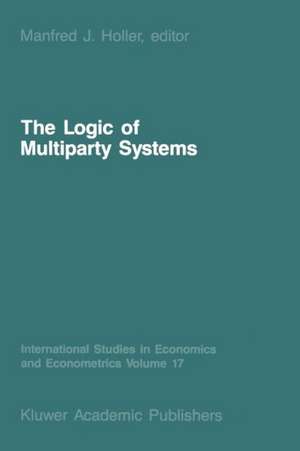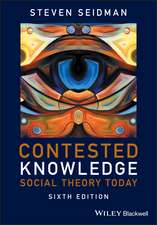The Logic of Multiparty Systems: International Studies in Economics and Econometrics, cartea 17
Editat de M.J. Holleren Limba Engleză Paperback – 27 sep 2011
Din seria International Studies in Economics and Econometrics
- 15%
 Preț: 586.02 lei
Preț: 586.02 lei -
 Preț: 358.56 lei
Preț: 358.56 lei -
 Preț: 391.40 lei
Preț: 391.40 lei -
 Preț: 390.25 lei
Preț: 390.25 lei - 5%
 Preț: 656.62 lei
Preț: 656.62 lei -
 Preț: 394.12 lei
Preț: 394.12 lei - 15%
 Preț: 643.99 lei
Preț: 643.99 lei -
 Preț: 390.46 lei
Preț: 390.46 lei -
 Preț: 387.75 lei
Preț: 387.75 lei -
 Preț: 390.08 lei
Preț: 390.08 lei -
 Preț: 389.11 lei
Preț: 389.11 lei - 18%
 Preț: 801.83 lei
Preț: 801.83 lei -
 Preț: 389.49 lei
Preț: 389.49 lei -
 Preț: 380.45 lei
Preț: 380.45 lei -
 Preț: 382.75 lei
Preț: 382.75 lei -
 Preț: 383.33 lei
Preț: 383.33 lei -
 Preț: 387.75 lei
Preț: 387.75 lei -
 Preț: 383.71 lei
Preț: 383.71 lei -
 Preț: 384.86 lei
Preț: 384.86 lei - 15%
 Preț: 642.83 lei
Preț: 642.83 lei - 15%
 Preț: 639.90 lei
Preț: 639.90 lei -
 Preț: 383.12 lei
Preț: 383.12 lei -
 Preț: 386.00 lei
Preț: 386.00 lei - 18%
 Preț: 955.70 lei
Preț: 955.70 lei - 15%
 Preț: 639.73 lei
Preț: 639.73 lei - 15%
 Preț: 643.48 lei
Preț: 643.48 lei - 15%
 Preț: 636.30 lei
Preț: 636.30 lei - 18%
 Preț: 954.62 lei
Preț: 954.62 lei - 18%
 Preț: 952.72 lei
Preț: 952.72 lei -
 Preț: 384.86 lei
Preț: 384.86 lei - 15%
 Preț: 645.60 lei
Preț: 645.60 lei - 15%
 Preț: 645.28 lei
Preț: 645.28 lei - 18%
 Preț: 953.35 lei
Preț: 953.35 lei - 18%
 Preț: 945.30 lei
Preț: 945.30 lei -
 Preț: 380.25 lei
Preț: 380.25 lei -
 Preț: 379.30 lei
Preț: 379.30 lei -
 Preț: 394.87 lei
Preț: 394.87 lei - 15%
 Preț: 589.95 lei
Preț: 589.95 lei -
 Preț: 383.33 lei
Preț: 383.33 lei - 15%
 Preț: 641.85 lei
Preț: 641.85 lei
Preț: 397.01 lei
Nou
Puncte Express: 596
Preț estimativ în valută:
75.97€ • 79.52$ • 63.23£
75.97€ • 79.52$ • 63.23£
Carte tipărită la comandă
Livrare economică 31 martie-14 aprilie
Preluare comenzi: 021 569.72.76
Specificații
ISBN-13: 9789401081146
ISBN-10: 940108114X
Pagini: 452
Ilustrații: 446 p.
Dimensiuni: 155 x 235 x 24 mm
Greutate: 0.63 kg
Ediția:Softcover reprint of the original 1st ed. 1987
Editura: SPRINGER NETHERLANDS
Colecția Springer
Seria International Studies in Economics and Econometrics
Locul publicării:Dordrecht, Netherlands
ISBN-10: 940108114X
Pagini: 452
Ilustrații: 446 p.
Dimensiuni: 155 x 235 x 24 mm
Greutate: 0.63 kg
Ediția:Softcover reprint of the original 1st ed. 1987
Editura: SPRINGER NETHERLANDS
Colecția Springer
Seria International Studies in Economics and Econometrics
Locul publicării:Dordrecht, Netherlands
Public țintă
ResearchCuprins
1 Introduction.- The Logic of Multiparty Systems: An Overview of Theoretical and Empirical Problems and Results.- 2 Efficiency and Stability Concepts in Multiparty Voting.- Bargaining in Weighted Majority Voting Games, With an Application to Portfolio Distributions.- Nash Bargaining Solutions of Multiparty Bargaining Problems.- Manipulation of Voting Mechanisms.- Manipulation in a Multiparty Parliament: The Case of the Norwegian Storting.- On the Existence of Political Equilibrium in a Three-Party System with Plurality Voting.- Elections with N Voters, M Candidates and K Issues.- 3 Multipartism and Political Stability.- Bargaining Theory and Cabinet Stability in European Governments.- Multipartism.- The Competitive Consequences of Polarized Pluralism.- On the Importance of Elections and Ideology for Government Policy in a Multi-Party System.- The Political Economy of Roll-Call Voting in the ”Multi-Party” Congress of the United States.- Parties and Party Systems in Latin America.- The Stability of Party Duopoly in Multi-Party Britain.- The Geography of Party Support: Comparative Studies in Electoral Stability.- 4 Electoral System Effects.- ’Representation of the People’: Aspects of the Relationship between Electoral Systems and Party Systems in the Federal Republic of Germany and the United Kingdom.- What Kind of Electoral System for Plural Societies? India as an Example.- Political Support in Multiparty Canada: 1980–84.- Performance of the Electoral System in Recent Canadian and British Elections: Advancing the Case for Electoral Reform.- The Logic of Plurality Voting in Multi-Party Systems: Tactical Voting in Liverpool Elections.- Determinants of the Number of Legislative Parties: Evidence from Postwar France.- Problems of and Solutions to Representation.-Thresholds for Proportional Representation: Reanalyzed and Extended.- Problems of Equity in Multiparty Representational Systems: What We Want and What We Can’t.- Party Discipline and the Power of Parties, Legislators and States.- Paradox Proof Decision Rules in Weighted Voting.










